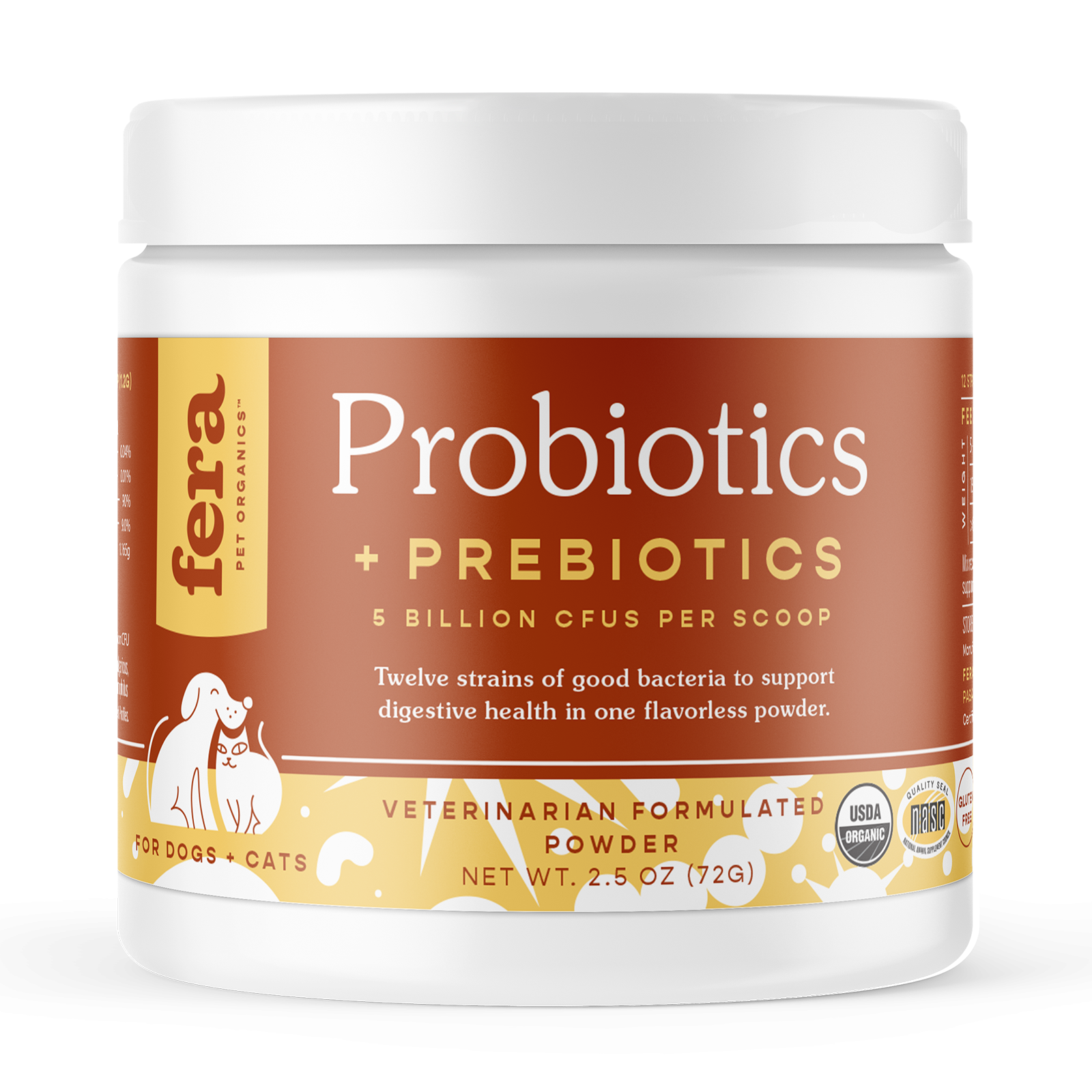Probiotics for Dogs: Supporting Your Furry Friend’s Gut Health
Support your dog’s health holistically with probiotics. These live microorganisms aid digestion, bolster immunity, and even support skin, joint, and cognitive wellness in canines. Choose reputable supplements and consult with your vet for an optimal regimen. Probiotics - for your furry friend's gut health.
Probiotics are beneficial and highly recommended for humans, but many pet parents are surprised to learn that these microorganisms are superb contributors to their canine companion’s overall health, as well.
Whether your veterinarian has recommended probiotics for dogs or you’re considering a more holistic approach to maintaining your furry friend’s well-being, read on to learn more about these tiny yet mighty allies and how you can easily introduce them into their diet.
What Are Probiotics?
Probiotics are live microorganisms, better known as good bacteria, that confer health benefits when consumed in adequate amounts. They primarily inhabit the gastrointestinal tract, fostering a delicate balance within the gut microbiome. While probiotics have been recognized for their positive impact on human health, their role in supporting canine wellness is now being extensively studied and acknowledged.
Exploring the Role of Probiotics for Dogs
The gastrointestinal system plays a pivotal role in a dog's overall health, functioning not only as a digestive organ but also as a vital component of the immune system. A balanced gut microbiome is essential for supporting proper digestion, nutrient absorption, and immune function in dogs. However, various factors such as stress, diet changes, infections, antibiotics, and aging can disrupt this delicate balance, potentially leading to gastrointestinal issues in the form of:
- Diarrhea
- Pancreatitis
- Obesity
- Yeast Overgrowth
- Mood Swings
- Leaky Gut
- Skin Problems
- Food Allergies
Introducing probiotics into a dog's diet can help maintain the balance of beneficial bacteria in the gut, thereby maintaining optimal digestive health and supporting the immune system. These beneficial bacteria also compete with harmful pathogens for space and nutrients within the gut, thereby inhibiting the growth of potential pathogens and the risk of gastrointestinal discomfort.
Plus, studies have shown that supplementing with probiotics can help shorten the duration and severity of diarrhea episodes in dogs, making it a valuable tool in managing gastrointestinal distress.
Beyond gastrointestinal health, emerging research suggests that probiotics may also support various aspects of your dog’s overall health including skin and coat, joints, allergies, cognitive function, and mood stability.
Choosing the Right Probiotic for Your Dog
Probiotics aren’t something you want to invest in without prior research. There are many to choose from out there, and finding the right one for your unique companion is crucial to ensure optimal efficacy and safety. Here are a few things to look for in reputable probiotics for dogs:
- 1 to 10 billion CFUs: The CFU number indicates how much bacteria is in a daily serving of the probiotic. Anything between 1 and 10 is a decent number, but the more the merrier.
- Specific beneficial strains: Different strains of bacteria provide different benefits. Some of the ones best suited for a dog’s overall health are:
- Manufacturer’s Contact Information: This is a sign that the business you’re purchasing from provides decent customer service. If you have any questions or concerns about your product, just get in touch with the manufacturer using the contact information on the label.
- NASC Seal: Any pet supplement with the NASC (National Animal Supplement Council) is an excellent sign that the product meets the organization’s rigorous standards for overall product quality.
The Best Ways to Serve Probiotics to Your Pet
Incorporating probiotics into your dog's daily routine is relatively easy, but there are some important factors to consider beforehand. First and foremost, I highly recommend consulting with your dog’s veterinarian first. They’ll be able to assess whether your dog will benefit from a probiotic and if there is anything important you need to know based on your pet’s unique health profile.
Next, you’ll need to decide which form of probiotic will work best for your pet. They can be served in powders, capsules, chews, and fortified foods. What works for one pet might not work for another, so choose the one you believe your furry friend won’t make a fuss over.
Consider Adding a Prebiotic
If you want to help your dog get the most out of their probiotic supplement, you might want to consider pairing it with a good prebiotic. These soluble fibers serve as a “food source” for probiotics, helping them to optimally fulfill their never-ending list of important duties.
There are standalone prebiotic supplements you can combine with your dog’s probiotics and supplements that contain both prebiotics and probiotics. If you’re not sure which one is best for your dog, don’t hesitate to contact your veterinarian.
Discover Natural Supplements Designed to Help Your Pet Thrive
We’re as passionate about your pets as we are about creating high-quality supplements made with wholesome ingredients you can trust. Learn more about us and our story and don’t forget to subscribe to our e-newsletter for exclusive deals, new product announcements, pet health tips, and more.
Sources:
National Library of Medicine




